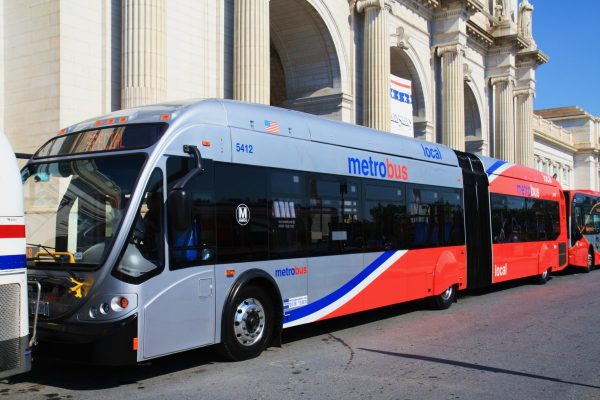Around 70% of Washington, D.C. bus riders evade fares on public buses according to data from the Washington Metropolitan Area Transit Authority (WMATA), the agency that operates public transit in the D.C. metropolitan area.
Although WMATA has recently installed new fare gates in Metro stations, renovated buses with more efficient fareboxes and expanded police efforts to enforce fares, the study has prompted the agency to consider changing its funding model to incentivize local governments to crack down on fare evasion. In the 2024 fiscal year, Metro buses brought in $50 million of revenue, while similarly priced trains brought in $301 million — even though ridership was around 5 million people more on buses than trains.
A WMATA spokesperson said the organization has officers patrolling the buses and available for drivers to enforce fees.
“Addressing fare evasion is an important part of our safety and security efforts, however, it is harder to enforce fare evasion on all 1,000+ buses on the street at one time versus fixed point entries at 98 rail stations,” a WMATA spokesperson wrote to The Hoya. “We continue daily fare evasion enforcement efforts in stations, at bus stops, and along routes to collect as many fares as possible.”
Riders evading fares in the WMATA system can face fines of up to $100, but law enforcement rarely disciplines fare evaders.
Ameara Smith (SFS ’28), a regular Metrobus user, said she often sees passengers dodging the fees.
“When I was last on the bus this guy got his friend to run on the bus,” Smith told The Hoya. “I think he was trying to skip. But then the driver didn’t really care.”
The high rate of fare evasion led WMATA to consider a new model for system funding at a board meeting Oct. 10.

The current system charges local governments in D.C., Maryland and Virginia based on how many people use Metrobus and Metrorail within those areas, meaning that increased ridership results in each of those local governments paying more to WMATA.
The new plan would reduce the amount each jurisdiction pays based on the amount that riders contribute in fares — pushing officials in those areas to enforce rules against fare evasion.
City council members have called for WMATA to eliminate bus fares, with the D.C. Council voting to make buses free within the District. D.C. Mayor Muriel Bowser and officials in Maryland and Virginia pushed back against the plan, which has not yet been implemented.
D.C. Councilmember Charles Allen, who chairs the committee for public transit, said the reality of bus use may lead to the need to remove fares.
“I’m probably one of the few elected officials who ride the bus frequently,” Allen told The Washington Post. “I get fussed at when I try to pay my fare; the drivers usually feel like I’m slowing things down.”
When passengers step through the doors of a bus, they are required to present their SmarTrip card — the payment system for riding transit in D.C. — or cash to pay for their trip; drivers are responsible for ensuring each rider pays.
Employers have told bus operators to avoid quarrels with passengers in matters of personal safety, potentially making responsibility to check payment less likely.
Benjamin Lynn, a person for the union representing Metrobus drivers, said the union is open to removing fares because enforcing fare collection would be difficult to establish.
“Improving fare collection isn’t going to solve the long-term funding issues WMATA faces,” Lynn told The Washington Post. “The only way to do that is to establish a dedicated funding force.”
Amanda Lowe (CAS ’28) said she sympathizes with the bus drivers, who can face difficult situations with unruly passengers.
“They probably feel anxiety,” Lowe told The Hoya. “I would feel anxiety, too. Nobody wants to have to confront a stranger about money. You never know how people are going to react and it can get scary.”
Lowe said she does not skip fares due to the fear of being socially reprimanded.
“Usually, I don’t do it because I don’t want to get yelled at,” Lowe said. “The anxiety of getting yelled at makes me not do it.”
Smith said she doubts many fare evaders feel the guilt for their unpaid rides.
“I don’t think that many people feel guilty because the money is going to the city,” Smith said. “It’s not like the money is going to go to the bus driver. If people don’t do it, it’s out of fear of being reprimanded.”
Lowe said she would understand if many free riders dodge payments simply out of necessity.
“I’ve been tempted to do it, but if I’ve done it, it’s only because I don’t have the resources — like I don’t have the card or I’m out of money,” Lowe said.
The WMATA spokesperson said riders taking care to pay the bus fee will support their service to the entire community.
“By paying the fare, customers are helping us deliver better service to the over 400,000 customers who rely on buses every single day,” the WMATA spokesperson wrote.